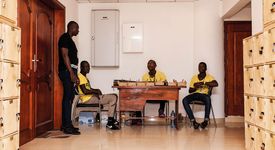Konecta wiped off the map. Delta Airlines has apologised, but Air France has not

90 years after its birth, Air France would have difficulty apologising to passengers, which Delta Airlines has managed to do. 80 years after its birth, the newspaper Le Monde is having some difficulty checking its sources: Konecta, the world's 5th largest BPO player, has been wiped off the map and off the market infographics, in a long article published by the newspaper on Teleperformance and the impact of generative AI.
Who is Fabien Pelous, who is Lisa Archbold, and how bad is Le Monde and the world? Here are a few of the week's news items on passenger, customer and call centre experience that we thought stood out.
We've all experienced the frustration and annoyance of a bad experience with a company. In some cases, this can degenerate into a traumatic experience, particularly in the tourism or air transport sectors: the stress of travelling and the timetables to be respected are sometimes added to the lack of understanding or the absurdity of the rules to which the customer can sometimes fall victim. Airlines are champions in this area. Two recent stories illustrate this.

Delta Airlines, the threatening breast:
Last January, Lisa Archbold boarded a Delta Airlines flight from Salt Lake City to San Francisco, when a stewardess pulled her aside before take-off. The reason? Her T-shirt would reveal the shape of her breasts and nipples. "The stewardess told her that when passengers wear offensive or revealing clothing, Delta's official policy is to exclude them from the flight", explained her lawyer, Gloria Allred. The US regulatory framework allows airlines to exclude a passenger from a flight only if they pose a risk to the safety of the aircraft or passengers, so the legality of Delta Airlines' policy is highly questionable. To be precise, Delta Airlines' rules on dress state that the airline may refuse carriage "when the passenger's conduct, attire, hygiene, or odor creates an unreasonable risk of offense or annoyance to other passengers".
Humiliated, the passenger nevertheless agreed to wear a jacket to hide her breasts from view. The airline said it had subsequently apologised to Lisa Archbold.
Lisa Archbold's lawyer summed up the mishap ironically:
"Neither her breasts nor any other woman's breasts have ever tried to take over a plane." (Neither her breasts nor any other woman's breasts have ever tried to take over a plane.)
Air France, confusion over an upgrade:
Americans are not the only ones to be rude and inappropriate. Air France, too, was recently singled out on social networks.
On 14 March, René Loucatel was delighted to take his mother to Vietnam. It was a significant trip for Jeannine: originally from the country, she had not been back for twenty-five years. Once at Charles de Gaulle airport, before boarding the plane, the two went to the Air France assistance desk. They were offered an upgrade to Business class, which they accepted and which René paid for, as Mr Loucatel's mother is elderly and suffers from mobility problems. At the boarding gate, the new upgraded tickets were abruptly refused by staff, according to René Loucatel. The mother and son were then told to return to economy class without any refund for the upgrade. According to René Loucatel's witness, who took the trouble to post the invalidated tickets and the bank statements showing the payments on social networks, the staff invoked vague excuses, first rejecting the authenticity of the upgraded tickets, and then justifying themselves with a "quota" excuse, without any further clarification.

That was the end of the matter. Polite, the Loucatels agreed to travel economy class. René Loucatel simply mentioned the facts on LinkedIn on his return. Since then, Air France has not come forward and, unlike Delta Airlines' apology, seems to have preferred to remain silent. The same misadventure relayed on X (ex-Twitter) has not caused the airline to react.
Contacted by us, Fabien Pelous, Senior-Vice-President Customer Experience at Air France, did not wish (or was not authorised?) to respond to our requests for explanations. Our first contact with this senior Air France executive was five months ago. At that time we asked him to write an article on the major projects that the company intended to carry out in the area of passenger experience. We never got a reply.
And yet Air France has won the Podium de la Relation Client eight times, one of the 14 events, prizes and labels (!) awarded on the subject in question in France alone.
Does Air France know when to apologise? What is the purpose of Saphir?
In 2014, Alexandre de Juniac, then Chairman of Air France-KLM, and Frédéric Gagey, CEO of Air France, sent a letter of apology to 4 million passengers after a lengthy staff strike.
On 4 July 2022, Anne Rigail, CEO of Air France, also "sincerely apologised for the delays and cancellations that occurred..." More than 170,000 baggage items were temporarily lost following these incidents.
The airline has a dedicated assistance service for people with reduced mobility, called Saphir, which can be found on the Air France website. It is only open at certain times, which are not announced in the voice message. The number given at 33969367277 is wrong and therefore unreachable. A specialist understands that you have to add a zero before the 9.
At Delta Airlines, more than thirty people have been dedicated since 2021 to listening to customer incidents on social networks, including X, and above all have the autonomy to resolve the most urgent problems.

Konecta, number 5 worldwide in call centres and BPO... has disappeared. Off the map of Le Monde.
In a long article published in Le Monde on Friday 29 March and entitled "Teleperformance, the call centre giant, faced with the dizzying prospect of artificial intelligence", the journalist who wrote the article attempts to pinpoint the real impact that AI will have on the BPO sector and in particular on Teleperformance, the world's number 1 in the sector.
Olivier Pinaud, the journalist in question, bases his article and his thoughts on some rather erroneous, old or incomplete studies: Konecta, for example, number 5 worldwide in the sector, with 130,000 employees, does not appear in any table listing the top ten players. Quite astonishing and quite serious, given that a large proportion of journalistic content is used to enrich generative AI. Which then produce and spit out other articles. Further on in the article, the press release published by Klarna a few weeks ago, whose limitations we have explained, is also quoted, as if it had been verified.
This week, the same daily devoted two other major articles to the impact of AI on call centres in Morocco and to a vast strike movement that has reportedly affected the 4 major players in telephone platforms in Greece: Teleperformance, Foundever, TTEC and Webhelp. In her article, journalist Marina Rafenberg writes: "On Wednesday 13 March, almost 10,000 employees of Greece's four major call centres were on strike for the third time since the start of the year. They are demanding pay rises, collective agreements and more permanent contracts".
You have to read on to learn that the figure of 10,000 is one that Nikolaos Spyrelis, a Teleperformance employee and member of the newly formed SETIP union, is delighted about. I don't know how many employees actually took part in the strike. But 10,000 at the major service providers alone would seem to be an exaggeration: it would mean that almost 25%, or even 33%, of their employees were on strike (no recent study compiles the total number of current jobs in Greece, but our data puts them at between 25 and 35 thousand. TP alone employs 12,000.
Out of three articles devoted to the BPO and call centre sector in one week, which is a rare occurrence, the evening daily published two rather approximate ones. The fear aroused by the impact of generative AI on employment is not only fed by the potential of the technology.
We'll tell you more about this strike in the next issue of En-Contact magazine, after looking at what's happening at Foundever in Greece. On the GMB (Google My Business) reviews of the company, many employees of the former Sitel are complaining. And not anonymously, unlike those quoted in Marina Rafenberg's article: Jessica Mitsi, Julia Amundrod and Katrin Dornstrey, all former employees, complain of late salaries and cumbersome HR processes at the world's No. 4 BPO company. True or false?

Hide that boob I can't see.
When it comes to dressing appropriately, in real life, flight attendants and school headmasters have an arduous, even dangerous task. On the web, it's simpler: generative AIs re-dress women who are too naked or whose outfits seem inappropriate to some. The one that has been the talk of the town recently is called DignifAI, created on 4chan. It has already 'dressed up' Kristen Stewart and Miley Cyrus.
Is the world in a bad way? No, they're both undergoing a major transformation. Journalism and the media are not dead, they're just going to have to change. And what about the airlines, some of which are learning to apologise? The fact that we don't need generative AI for this delicate task is good news.
To find out more:
The last time we talked about required or suggested dress code and hostesses was at the 2023 French Open. It was a question of the hostesses' dress and also of the rules. Read Maristel'O's exclusive explanation here.
Youssef El Aoufir, co-founder of Intelcia, reassured the audience at the recent meeting held in Morocco about the impact of AI on the contact centre sector, which is very present and provides jobs in the Kingdom. The more technology there is, the more there is a need for complex technical assistance", said the engineer, who is well acquainted with these changes.
Manuel Jacquinet and En-Contact editorial staff.
NB: When contacted, René Loucatel did not say whether the company had contacted him since his post.






